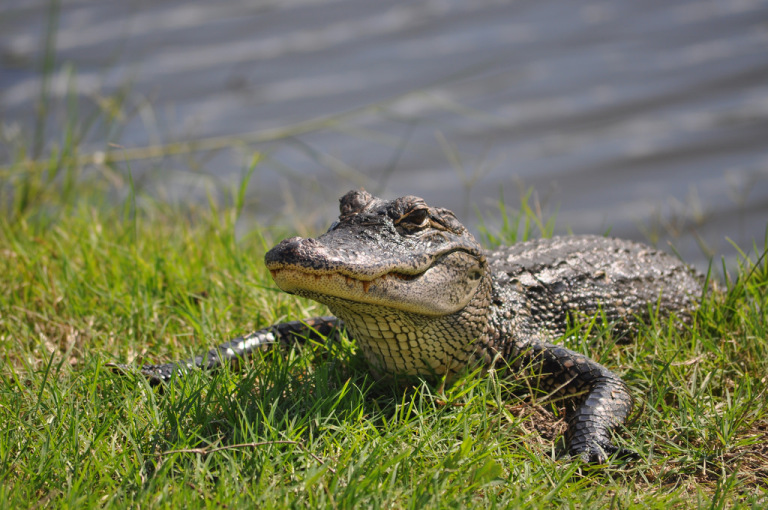Fish Report for 10-25-2018
Can I Start an Alligator Farm?

by CDFW
10-25-2018
Website
Question: There was once an alligator farm in Los Angeles. It’s not there anymore but I am wondering what it would take to start an alligator farm in California. What kind of permits would I need to raise them for meat and their hides? Could I legally bring alligators into the state or import them from other states that allow them? (Kent, Florida)
Answer: Although it is long gone, yes, you are correct about the past existence of an alligator farm in California! Research indicates there was a place called Los Angeles Alligator Farm that opened near the turn of the last century in Southern California. It persisted in one form or another for several decades before closing due to a decline in visitors. It was more of a tourist attraction than a place where alligators were raised and sold for meat and leather, which is what most people think of when they hear the word “farm.”
Today, there are three primary laws that make your business idea non-viable. In 1991, the California Legislature enacted section 5062 of the Fish and Game Code (FGC), which states that no permit shall be issued for the operation of a farm for alligators or any species of the family crocodilidae if the animals are kept for the use and sale of the meat or hides. FGC, section 2118(f), states it is unlawful to prohibit import, transport, possess, or release alive into this state any wild animal of the family crocodilidae. California Penal Code, section 653o, states that commencing on Jan. 1, 2020, it shall be unlawful to import into this state for commercial purposes, to possess with intent to sell, or to sell within the state, the dead body, or any part or product thereof, of a crocodile or alligator.
There are plenty of permitted facilities in California that have alligators (including zoos, sanctuaries and other educational facilities), but the law prohibits any of these facilities from raising the animals to sell the meat or hides. Laws that prohibit possession of alligators and crocodiles unfortunately don’t stop some people from acquiring these animals or bringing them into the state illegally. California’s wildlife officers have at least a few cases per year of illegal possession. Most people who acquire alligators and crocodiles illegally have no idea how to properly care for them, which creates an animal welfare issue. We also don’t want non-native animals – especially predatory ones – being accidentally or intentionally released into California’s wild.
In short, current law prohibits you from acquiring a permit to farm alligators, import them or even possess them in California, and by January 2020, you wouldn’t be able to sell any parts thereof, regardless of where they came from.
Salmon Fishing in the Delta
Question: Is it legal to fish for salmon in the Delta, below the I-80 bridge? (Mark)
Answer: Mark, bridges are important landmarks and boundaries with regard to salmon fishing regulations in California. If you are referring to fishing below the Caltrans Maintenance Worker Memorial Bridge that spans the Sacramento River in West Sacramento, Sacramento River regulations apply. The season in that part of the river system runs from July 16 through Dec. 16 with a daily limit of one Chinook Salmon with two Chinook Salmon in possession.
Traveling further west down Interstate 80 near Crockett, the Carquinez Bridge is the dividing line between ocean salmon sport fishing regulations to the west and inland regulations to the east. Below – or west – of the Carquinez Bridge, the ocean Chinook Salmon season is open from June 17 through Oct. 31, 2018, with a minimum size limit of 20 inches and a daily bag limit of two salmon. Depending on where you are fishing east of the Carquinez Bridge in the Delta, different regulations may apply.
In the San Joaquin County portions of the Delta, for instance, Mokelumne River salmon regulations may apply. The salmon season there runs from July 16 through Dec. 16 with a daily limit of two Chinook Salmon. Please consult the 2018-2019 California Supplement Sport Fishing Regulations along with the 2018-2019 California Freshwater Sport Fishing Regulations for detailed boundaries and descriptions. We thank you for being a conscientious salmon angler and wish you good luck the remainder of the season.
More Reports
California Department of Fish & Wildlife Reports
for Thursday, October 25th, 2018: Recreational Dungeness Crab Fishery Delayed in State Waters in Northern Humboldt and Del Norte Counties
California Department of Fish & Wildlife Reports
for Wednesday, October 24th, 2018Trinity River - Upper: Upper Trinity River Quota Met

Website Hosting and Design provided by TECK.net